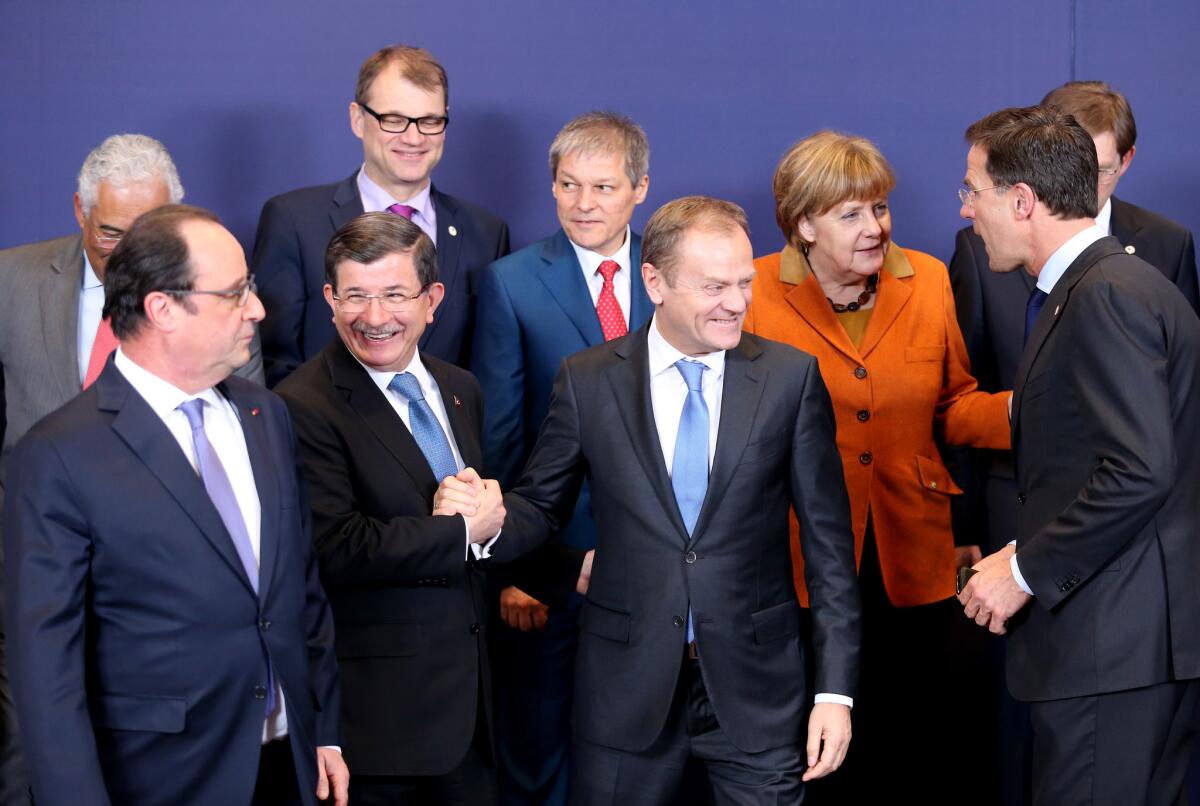European Union and Turkey push to make a deal on the migrant crisis

European Council President Donald Tusk, front center right, shakes hands with Turkish Prime Minister Ahmet Davutoglu in Brussels on March 7, 2016.
- Share via
Reporting from London — While European Union leaders on Monday looked for Turkey to help stem the arrival of more migrants, Turkish officials sought an additional $3.3 billion to help the country handle the influx of newcomers.
Political leaders were gathered in Brussels for a summit aimed at working out how to manage the thousands of men, women and children arriving on Europe’s shores daily and devising a plan for stopping yet more people from making their way there.
Turkey has become a temporary home to approximately 2.7 million migrants who have fled war-torn homelands or poverty in the Middle East and Africa. Many migrants have made the perilous journey across the Aegean Sea to get from Turkey to Greece, where they hope to travel and seek asylum in wealthier parts of mainland Europe such as Germany or Scandinavia.
The emergency meeting was called so leaders of the 28-nation EU could ask the Turkish government to prevent more people from attempting the crossing by sea and to take back thousands of migrants who had already arrived in Greece.
Entering the summit in Brussels, Turkish Prime Minister Ahmet Davutoglu, said: “The whole future of our continent is on the table where we need solidarity between us, and I am happy today that there is much more intensive awareness of these challenges among the European leaders.”
Many of the migrants are from Syria and have made the journey to Europe with only a handful of personal belongings and their life savings. People smugglers are rife along the route and thousands of migrants have been cast adrift into dangerous waters aboard flimsy boats that have capsized or sunk.
In an effort to discourage the crossings, the North Atlantic Treaty Organization announced Sunday that it was deploying warships to Greek and Turkish waters to assist the EU’s Frontex border agency.
British Royal Navy vessels will also be patrolling the route, which has enabled more than 123,000 migrants to land in Greece this year.
As warmer weather arrives in the area, there are fears the numbers of people attempting the crossing will rise, regardless of the danger.
On Sunday, at least 25 people drowned off the Turkish coast while attempting to reach Greece.
Leaders arrived at the summit in chauffeur-driven cars, talking tough before disappearing inside for hours-long meetings.
“This is our common problem,” Greek Prime Minister Alexis Tsipras told reporters as he entered the summit. “It’s not a problem of one country, it’s a European problem so we have to find a collective European solution in this problem.”
But the challenges of agreeing on a plan became evident. A news conference scheduled for late afternoon was canceled and reporters were informed that the meeting would run into the evening.
Turkey appeared to be using the summit to gain some important ground on its desire to become an EU member, a wish that has so far eluded it. It also tried to negotiate that in return for cooperation on the migrant crisis, plans to ease visa requirements for Turks wanting to travel in Europe would be sped up.
“To avoid that refugees arrive in Greece we have to cooperate with Turkey,” French President Francois Hollande said.
Yet as the leaders met in Brussels, the situation for thousands of migrants looking for a better, safer life continued to deteriorate.
About 13,000 migrants remained stranded along Greece’s northern border after Macedonia closed its border in an effort to stop people traveling into mainland Europe along the Balkan route.
The move was supported by Slovenia, Croatia, Serbia and Austria, but has caused a huge backlog of people who have no money and nowhere to turn.
Boyle is a special correspondent.
More to Read
Sign up for Essential California
The most important California stories and recommendations in your inbox every morning.
You may occasionally receive promotional content from the Los Angeles Times.










